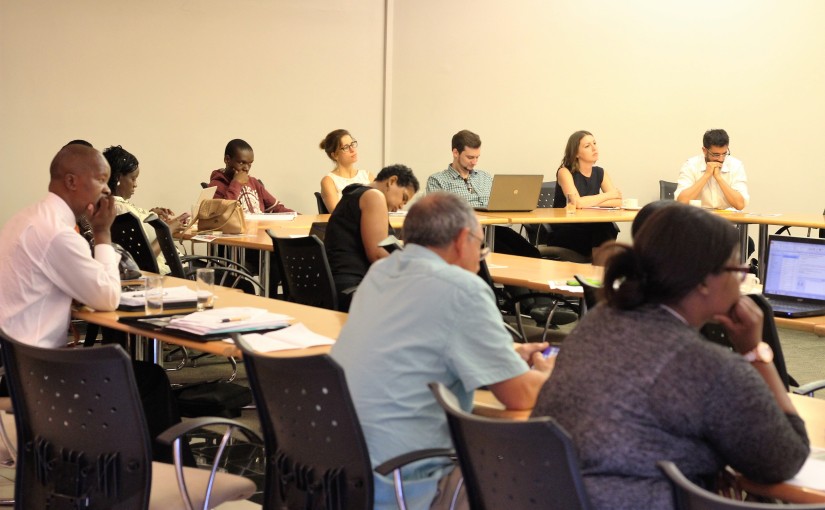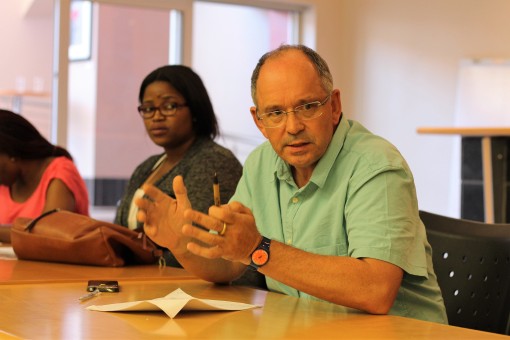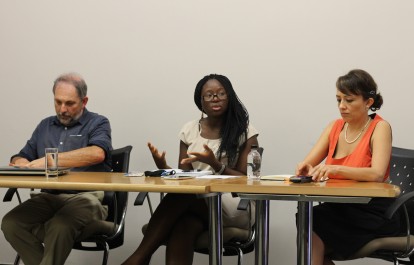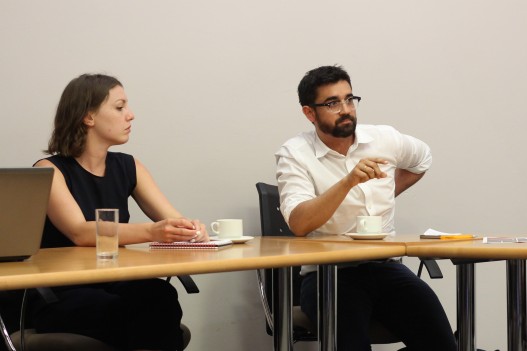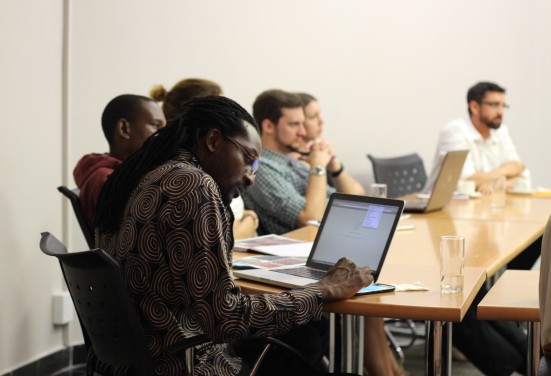STOP THE PLUNDER: AFRICA IS NOT FOR SALE
The Legal Resources Centre, as part of the Global Campaign to Dismantle Corporate Power and, separately, the Treaty Alliance, was in Geneva during the final week of October 2017 for the third session of the open-ended intergovernmental working group (IGWG) on the elaboration of a binding treaty on transnational corporations and other business enterprises with respect to human rights.
The Global Campaign and Treaty Alliance are working collectively to advocate for a strong Binding Treaty to Stop Corporate Abuse and to prevent and remedy human rights abuses by transnational corporations and other companies.
The Binding Treaty process has been going on for many years. This was the crucial third session of the Inter-Governmental Working Group, where the draft elements of the Treaty were submitted by Ecuador, as the chair, for discussion. The submissions made during this session are on those elements.
The EU and others tried to force an end to this process by arguing that the resolution that constituted the Working Group provided for 3 sessions only and a new resolution must be sought to continue the work. The Treaty Alliance and allies worked hard on lobbying against this backlash and supporting South Africa, who is pushing for the process to continue. The outcome of the meeting, after tense negotiations on Friday last week, was that the chair must informally consult on how to take the process forward.
The Alliance and allies are pushing for a draft zero of the Binding Treaty to be presented and discussed at the 4th IGWG meeting at the end of next year.
The LRC made the following submissions during the sessions:
Oral Submission – Subject 1: General framework
Thank you Chairperson and congratulations on your appointment. My name is Lucien Limacher. I am from the Legal Resources Centre from the Johannesburg office in South Africa.
I am viewing the draft elements document from a viewpoint of respecting, protecting and promoting the core environmental and sustainability principles widely accepted and fundamental to the survival and development of vulnerable communities who face, often unwanted, development projects imposed by TNCs, OBEs and states.
At Preamble: In terms of the preamble, there are two core international environmental laws or policies that are currently not mentioned within the draft elements document, which play a critical role on the impact TNCs and OBEs have on human right violations. The first pertains to the lack of reference to the various international treaties on climate change; we cannot ignore the anthropocentric impact of TNCs and OBEs have on climate change and of course then on human rights. The second international environmental issue relates to the failure to acknowledge the Development Sustainable Goals that were agreed upon in terms of the 2030 Agenda for Sustainable Development read with the Rio Declaration and the Johannesburg Declaration on Sustainable Development. It is critical that TNCs and OBEs follow a sustainable development pattern that does not impact the livelihood of communities. As such the treaty should reflect in the preamble the above two aspects.
At Principles: Taking the above context into consideration, the same problem can be expanded on under the principles section wherein the draft elements document failed to take cognisance of the following critical environmental principles that impact the human rights discourse:
- The first principle that must be included is the Cradle-to-Grave principle;
- The second principle that must be included is Prior Environmental Impact Assessment Principle (this must go along with the human rights impact assessment mention in the draft element document);
- The third principle that must be included is the Public Trust Principle;
- The fourth principle that must be included is the Polluter Pays Principle; and
- Lastly, the fifth principle that must be included is the Sustainable Use and Equity Principle.
Lastly, at Purpose: Within this section, it was mention that adequate remediation is to be used as an effective remedying tool. It is this submission that remediation must include rehabilitation of the environment if the environment has been degraded by an activity of a TNC or an OBE.
Thank you.
Oral Submission – Subject 2: Scope of Application
Thank you Mr Chairperson Rapporteur
The Legal Resources Centre is a public interest law firm based in South Africa. We represent individuals and communities in protecting their rights against the impact of often unwanted and imposed development projects in the extractives and other sectors.
We endorse the principle of the primary responsibility of States to protect and promote the human rights of its citizens against all transnational corporations and other businesses enterprises who abuse these. We cannot afford another narrow instrument that creates yet more loopholes for impunity to thrive. But we also cannot pretend that States do not operate in the context of the corporate capture of their law and policy making processes and its implementation. This is pervasive on the African continent, a continent regarded as the new frontier for extractivism and large scale agri-business.
While we strongly endorse explicit measures to be included in the treaty to guard against corporate capture suggested by colleagues earlier, we fear that these may not be sufficient to break the stronghold of corporate capture over the States mandated to protect and promote the human rights of their citizens. In order to make meaningful progress, this process must acknowledge the importance of placing relative power in the hands of the peoples, communities and individuals whose rights are affected by the actions of TNCs and OBEs.
They must be central to the decision-making processes that authorize projects and their implementation. The inclusion in decision-making of affected individuals provides a further safeguard against corporate capture. The principle of Free, Prior and Informed Consent, already entrenched in international law and increasingly recognized as imperative to the success of international voluntary standards, must be included in the treaty as a step towards not only providing remedies to human rights abuses, but indeed preventing those abuses from occurring. There is growing consensus in this room that prevention of abuse is indeed what we are collectively pursuing.
FPIC creates a meaningful seat at the table for those directly affected by the actions of TNCs and OBEs and at the same time strengthens the hands of States to act decisively in the interest of their people in the face of corporate interests. Even better, it ensures that rural women, who continue to bear the brunt of the impacts of TNCs and OBEs, are recognized as actors in their own development paths, rather than mere victims.
We thank you.
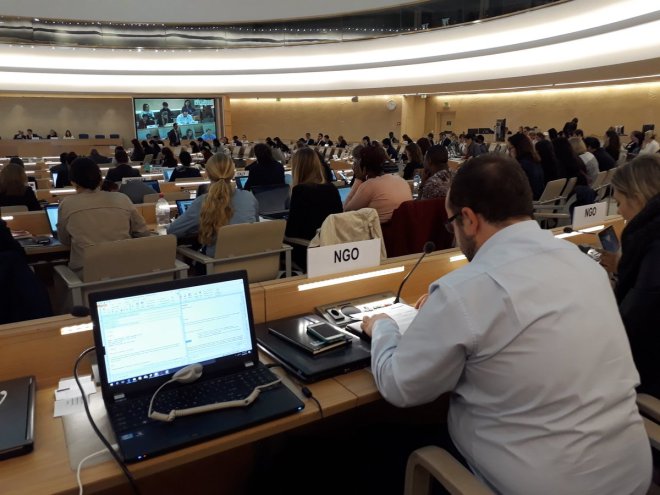
Oral Submission – Subject 4: Preventive Measures
Good afternoon Chairman Rapporteur. My name is Lucien Limacher from the Legal Resources Centre, South Africa.
One of the Legal Resources Centre’s missions is to seek creative and effective solutions by using a range of strategies. These, amongst others, include impact litigation, law reform, participation in partnerships and development processes, education, and networking within South Africa, the African continent and at the international level.
In capturing this spirit above, this section, Preventive measures, under the draft elements document can be the start of a creative and effective tool to stop the corporate impunity currently impacting affected communities and the environment.
Taking my colleague’s statement made yesterday that, “we cannot pretend that States do not operate in the context of the corporate capture of their law- and policy-making processes and their implementation,” it is fitting at this juncture that the following three points are made relating to the section on preventive measure:
The first point relates to the phrase, “all concerned TNCs and OBEs shall adopt a vigilance plan consisting of due diligence procedures to prevent human rights violation abuses.” Although a binding vigilance plan is welcomed it does not go far enough in preventing human and peoples’ rights including community rights that revolve around environmental pollution, degradation and even destruction of livelihoods. It is therefore proposed that the draft elements document incorporates, over and above a binding vigilance plan, an article or clause that allows for a procedure for public comment, consultation and, where relevant, consent or agreement with the plan at this early stage of a human rights risk assessment exercise or vigilance plan.
This brings me to the second point namely elaboration in the draft elements document to incorporate unequivocally the right to free prior informed consent (“FPIC”). The words “states shall promote adequate consultation” must, in the case of directly affected communities, include, “free prior informed consent to be obtained from affected communities.” Failing to recognise FPIC will leave affected communities by the wayside and allow the status quo to continue and over shadow universal human rights and to degrade the environment. FPIC and the right to development is recognised in the African Charter on Human and Peoples’ Rights, it is emphasised in the UN resolution A/HRC/RES/26/9 and in the Declaration on the Right to Development, adopted by the General Assembly through its resolution 41/128 on 4 December 1986.
Lastly, the third point refers to the human rights impact assessment. As mentioned in the Legal Resources Centre submission under general frameworks, it is critical than when a human rights impact assessment is undertaken that a similar impact assessment is carried out regarding the environment.
I thank you.
Oral Submission – Subject 9: Mechanisms for Promotion, Implementation and Monitoring
The Legal Resources Centre firstly responds to a comment made by a panelist on the topic of Jurisdiction this morning that corporate violations happen only in countries with “fragile democracies”. We strongly reject that suggestion. Evidence suggests that there is hardly a country in the world that is not the location of human rights violations by corporates. Perhaps our disagreement lies in what the panelist regards as human rights abuses. The purpose of this legally binding treaty is not only to end the grossest of human rights violation, but also those violations that, through corporate capture, have become normalized and even legalized in several countries. For examples, look no further than the land and resource grabbing and environmental degradation pervasive on the African continent.
The LRC notes that civil society and even states from across the world have persistently raised the principle and right of Free, Prior and Informed Consent (or FPIC) to be included in this treaty in this forum. As we move towards negotiating a draft text in 2018, we wish to elaborate on how FPIC should act as a mechanism for the promotion, implementation and monitoring of the human rights of affected communities. FPIC refers both to a substantive right under international-, regional – and indigenous customary law as well as a process designed to ensure satisfactory development outcomes.
To realise this right, the affected community’s decision whether to allow development that will affect their rights, should be made free from any obligation, duty, force or coercion. Secondly, the community has the right to make the development choice prior to any similar decisions made by government, finance institutions or investors. In the words of the African Commission on Human and Peoples’ Rights, the community’s right to FPIC is not realised if they are presented with a project as a fait accompli. Thirdly, the community must be able to make an informed decision. That means that they should be provided sufficient information to understand the nature and scope of the project, including its projected environmental, social, cultural and economic impacts. Such information should be objective and based on a principle of full disclosure. The community should be afforded enough time to digest and debate the information.
Finally, consent means that the community’s decision may be to reject the proposed development. Consent is not mere consultation. The community can say no. Because the right to say no places the community in a position to negotiate, it is also a process. FPIC is not designed only to stop undesirable projects, but also to provide communities with better bargaining positions when they do consider allowing proposed developments on their land or resources.
FPIC should not be relegated to a risk-management exercise. Rather, FPIC should be the basis upon which the relationship between the affected community and the company is built. The role of the State in enforcing this right is crucial, but not a prerequisite for building more equitable negotiating and bargaining positions between the affected communities and the developers.
Thank you.
Oral Submission: Subject 10: Victims
The Legal Resources Centre is a 4 decades old public interest law firm based in South Africa.
My colleagues and I are community lawyers who have represented communities against corporates and mining companies for 4 decades between us. We base our arguments on our experience, community instructions and numerous court cases.
We are adopting this slightly pompous introduction in reply to the expert corporate lawyer on the panel yesterday who introduced himself and rooted his knowledge and experience in taking instructions from corporate TNCs for a decade.
Communities in the south know themselves far better than TNCs, they know their histories and they will take responsibility for their destinies and that of their children. Our communities have knowledge and they have agency. They are not victims. Faceless TNCs in the capitals, their directors and their shareholders, their legal and financial advisors and financiers may never know what it means to be cared for in a community context.
We have time for just one story, but please know that there are many. This is the story of the Xolobeni community.
Ms Nonhle Mbuthuma Forslund is one of the great women leaders of the Xolobeni community, Pondoland South Africa, a community that has held out for more than a decade against an Australian mining company TEM … a titanium mine that would destroy the community and the livelihoods of the families on their ancestral land. The struggle against a mine that has also lead to the callous murder of the community leader Bazooka Radebe 18 months ago. The murder remains unresolved. Nonhle cannot be here today because a bureaucrat in the Swiss Consulate in South Africa rejected her visa application three times over… partly because her village does not have street numbers and electricity bills. But in fact she has much more …. She belongs. She belongs to her community and the community’s land. They know their history, they have an indigenous legal system and they remain committed to choosing their own development path in terms of pace and scale. Nonhle’s community went to court saying that law from below gives them the right to say no and we should support her with a binding instrument at the level of international law.
Yesterday, the Southern African Permanent Peoples’ Tribunal[1] Jurors’ report, was released. The Xolobeni and Marikana communities together with 17 other communities gave evidence before a jury consisting of peoples’ jurors. They have respect for law from below. The expert corporate lawyers should take note of what the report says (and we can provide them with copies), for example:
- With economic gain as the prime motivation, anything that hinders that objective is treated by states and TNCs as an obstacle that must be subdued or eliminated. The pursuit of gains and profits for the TNCs and as revenue for governments place the communities and the environment at great risks.
- The constant refrain “NOT without our consent,” demonstrates a peoples-rooted development.
- It is important to explore legal mechanisms making the national governments and the TNCs accountable at domestic, regional and national level. It is vital for States to recognise progressive and participatory indigenous customary law. We must engage in the discussion of treaty law and state domestic law that can be self-executing and monitored by communities as principal actors, in co-operation with civil society. The evidence presented to the peoples’ tribunal shows that state and corporate law continues to mistreat the poor.
Chair Rapporteur, whoever tries to stop or delay this process today, and those who have not even showed up, shall have that reality on their conscience.
We thank you.
For more on the Binding Treaty: https://www.escr-net.org/corporateaccountability/hrbusinesstreaty
Twitter: Follow Treaty Alliance @treatyalliance and the hashtags #BindingTreaty #StopCorporateAbuse

